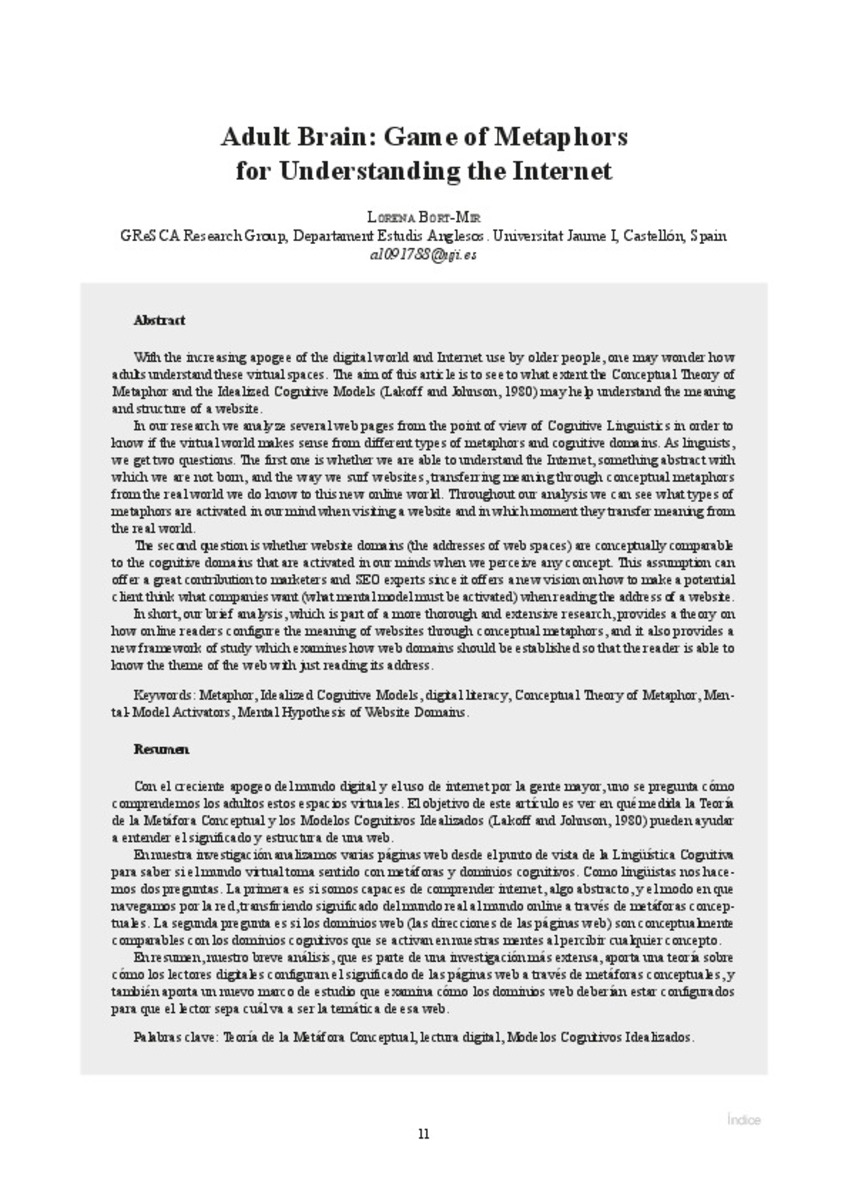Mostrar el registro sencillo del ítem
Adult Brain: Game of Metaphors for Understanding the Internet
| dc.contributor.author | Bort-Mir, Lorena | |
| dc.date.accessioned | 2017-01-16T11:14:34Z | |
| dc.date.available | 2017-01-16T11:14:34Z | |
| dc.date.issued | 2016 | |
| dc.identifier.citation | BORT MIR, Lorena. Adult Brain: Game of Metaphors for Understanding the Internet. Ariadna: cultura, educación y tecnología, 2016, no. 3, p. 11-16 | ca_CA |
| dc.identifier.issn | 2340-7719 | |
| dc.identifier.uri | http://hdl.handle.net/10234/165351 | |
| dc.description.abstract | With the increasing apogee of the digital world and Internet use by older people, one may wonder how adults understand these virtual spaces. The aim of this article is to see to what extent the Conceptual Theory of Metaphor and the Idealized Cognitive Models (Lakoff and Johnson, 1980) may help understand the meaning and structure of a website. In our research we analyze several web pages from the point of view of Cognitive Linguistics in order to know if the virtual world makes sense from different types of metaphors and cognitive domains. As linguists, we get two questions. The first one is whether we are able to understand the Internet, something abstract with which we are not born, and the way we surf websites, transferring meaning through conceptual metaphors from the real world we do know to this new online world. Throughout our analysis we can see what types of metaphors are activated in our mind when visiting a website and in which moment they transfer meaning from the real world. The second question is whether website domains (the addresses of web spaces) are conceptually comparable to the cognitive domains that are activated in our minds when we perceive any concept. This assumption can offer a great contribution to marketers and SEO experts since it offers a new vision on how to make a potential client think what companies want (what mental model must be activated) when reading the address of a website. In short, our brief analysis, which is part of a more thorough and extensive research, provides a theory on how online readers configure the meaning of websites through conceptual metaphors, and it also provides a new framework of study which examines how web domains should be established so that the reader is able to know the theme of the web with just reading its address. | ca_CA |
| dc.description.abstract | Con el creciente apogeo del mundo digital y el uso de internet por la gente mayor, uno se pregunta cómo comprendemos los adultos estos espacios virtuales. El objetivo de este artículo es ver en qué medida la Teoría de la Metáfora Conceptual y los Modelos Cognitivos Idealizados (Lakoff and Johnson, 1980) pueden ayudar a entender el significado y estructura de una web. En nuestra investigación analizamos varias páginas web desde el punto de vista de la Lingüística Cognitiva para saber si el mundo virtual toma sentido con metáforas y dominios cognitivos. Como lingüistas nos hacemos dos preguntas. La primera es si somos capaces de comprender internet, algo abstracto, y el modo en que navegamos por la red, transfiriendo significado del mundo real al mundo online a través de metáforas conceptuales. La segunda pregunta es si los dominios web (las direcciones de las páginas web) son conceptualmente comparables con los dominios cognitivos que se activan en nuestras mentes al percibir cualquier concepto. En resumen, nuestro breve análisis, que es parte de una investigación más extensa, aporta una teoría sobre cómo los lectores digitales configuran el significado de las páginas web a través de metáforas conceptuales, y también aporta un nuevo marco de estudio que examina cómo los dominios web deberían estar configurados para que el lector sepa cuál va a ser la temática de esa web. | ca_CA |
| dc.format.extent | 6 p. | ca_CA |
| dc.format.mimetype | application/pdf | ca_CA |
| dc.language.iso | eng | ca_CA |
| dc.publisher | Universitat per a Majors de la Universitat Jaume I | ca_CA |
| dc.relation.isPartOf | Ariadna: cultura, educación y tecnología, 2016, no. 3 | ca_CA |
| dc.rights | Atribución-NoComercial-SinDerivadas 4.0 España | * |
| dc.rights.uri | http://creativecommons.org/licenses/by-nc-nd/4.0/ | * |
| dc.subject | metaphor | ca_CA |
| dc.subject | idealized cognitive models | ca_CA |
| dc.subject | conceptual theory of metaphor | ca_CA |
| dc.subject | mental-model activators | ca_CA |
| dc.subject | mental hypothesis of website domains | ca_CA |
| dc.subject | digital literacy | ca_CA |
| dc.subject | teoría de la metáfora conceptual | ca_CA |
| dc.subject | lectura digital | ca_CA |
| dc.subject | modelos cognitivos idealizados | ca_CA |
| dc.title | Adult Brain: Game of Metaphors for Understanding the Internet | ca_CA |
| dc.type | info:eu-repo/semantics/article | ca_CA |
| dc.rights.accessRights | info:eu-repo/semantics/openAccess | ca_CA |
| dc.relation.publisherVersion | http://ariadna.uji.es/issues/03/ariadna_03_2016.pdf | ca_CA |
| dc.type.version | info:eu-repo/semantics/publishedVersion |
Ficheros en el ítem
Este ítem aparece en la(s) siguiente(s) colección(ones)
-
ANG_Articles [308]
-
Ariadna_2016_núm. 3 [11]








